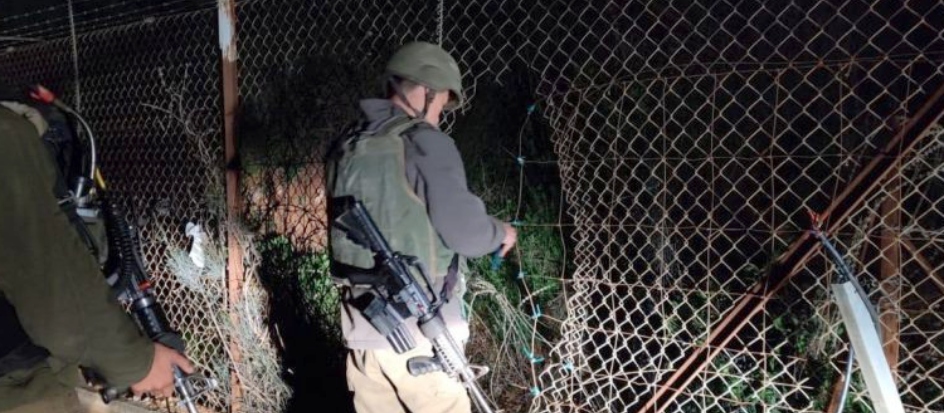On May 19, the IDF apprehended two Sudanese citizens that crossed the border from Lebanon into Israel near the Israeli community of Dovev, located opposite the southern Lebanese villages of Rmeish and Yaroun. About two weeks earlier, on May 3, IDF forces detained another five Sudanese citizens who had infiltrated from Lebanon into Israel in the western border region.
Are these Sudanese citizens a Hezbollah proxy? Are the recent border infiltration from Lebanon into Israel perpetrated by Sudanese citizen a vigilance test or a trial run orchestrated by Hezbollah in preparation of some offensive action against Israel (a kidnapping?), or are they simply an attempt to escape from Lebanon into Israel where a better economic future can be established as migrant workers?
In our estimation, Hezbollah’s operational readiness to carry out an abduction operation already exists; Hezbollah has the ability to carry out such an action on relatively short notice. Hezbollah demonstrated operational capability and preparedness during an operation in conducted on April 17, when it sabotaged the border fence between Lebanon and Israel at three different points simultaneously and at a great distance from one point to another. One of the points breached and sabotaged was near the Israeli community of Dovev. This came after only two days in response to a targeting of a Hezbollah vehicle traveling on a road near the al-Masna border crossing between Syria and Lebanon (April 15).
During their investigation, the Sudanese citizens claimed to have crossed the fence in order to find work in Israel. It is unclear whether Hezbollah briefed the Sudanese as proxies, using the border crossing as a Hezbollah operational trial run, intended for a future military action. Alternatively, it can be that the Sudanese explanation is authentic and their border crossing is due to Lebanon’s difficult economic situation (exacerbated by the Corona crisis), causing the firing of quite a few migrant workers, together with racist incidents against them.
The difficult economic situation in Lebanon in light of the Corona virus can be ascertained from the comments of Lebanese Prime Minister Hassan Diab from May 21: The Corona virus dramatically affected Lebanon’s economic crisis forcing the Lebanese government to freeze the state budget, which has serious social and economic consequences.
Diab stated that Lebanon faces danger of a hunger crisis and that many citizens have stopped buying basic food items such as meat, fruits and vegetables, the fear is that they will also stop buying bread (in this context, it should be noted that Russia stopped wheat exports to Lebanon).
On April 17 and May 17, two more events occurred. On April 17 a narcotics smuggling deal took place near the village of Ghajar, located in the eastern sector, at the foot of Mount Dov (“Shebaa Farms“) on the border between Israel and Lebanon. The second event occurred on May 17 when a Lebanese Shepherd infiltrated Israel in the Mount Dov area (“Shebaa Farms“) where there is no border fence. From our knowledge of Hezbollah’s pattern of operations, most of the drug smugglers and shepherds, particularly those who work in these areas, are “employed” by Hezbollah as proxies for the purpose of intelligence gathering and reporting on IDF activity. In this case, we estimate that the drug smuggling activity and the infiltration of the shepherd into Israeli territory are intended to assess the response of the IDF forces for Hezbollah’s ongoing day-to-day intelligence gathering and not for the planning of a concrete Hezbollah operation.
Hezbollah’s executive council member Hashim Safi Al Din stated in an interview on May 19 with “Al Mayadin” (a Lebanese channel supporting Hezbollah), that Hezbollah is not interested in war with Israel but is prepared for any act of Israeli aggression…
Should one rely on the words of Hashim Safi Al Din? Or rather, will the very difficult economic situation in Lebanon, which is only getting worse due to the corona virus, push Hezbollah into the corner? Since the start of the Lebanese economic protests in October 2019, Hezbollah is fighting a war on its image in the Lebanese public opinion. To get out of the corner there is a possibility that Hezbollah will want to take extreme action in the form of measures against Israel, also due to international pressure of the sanctions on Iran and Hezbollah. We believe that such a possibility exists but with low probability. We estimate that Hezbollah, at this point, has no interest in taking action that will escalate the situation in the region. In light of this, it is our assessment that the of Sudanese citizen’s infiltrations from Lebanon into Israeli territory are based on the economic situation in Lebanon and the search for employment in Israel.






